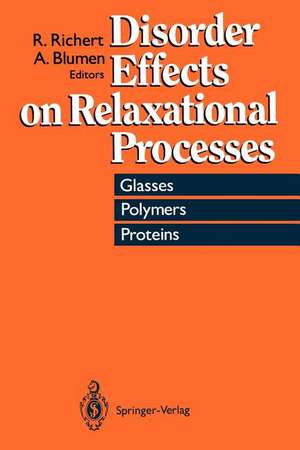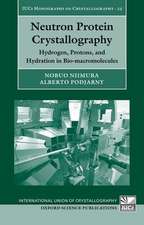Disorder Effects on Relaxational Processes: Glasses, Polymers, Proteins
Editat de Ranko Richert, Alexander Blumenen Limba Engleză Paperback – 13 dec 2011
Preț: 663.79 lei
Preț vechi: 780.93 lei
-15% Nou
Puncte Express: 996
Preț estimativ în valută:
127.02€ • 135.82$ • 105.90£
127.02€ • 135.82$ • 105.90£
Carte tipărită la comandă
Livrare economică 18 aprilie-02 mai
Preluare comenzi: 021 569.72.76
Specificații
ISBN-13: 9783642785788
ISBN-10: 3642785786
Pagini: 772
Ilustrații: XIII, 754 p. 1 illus.
Dimensiuni: 155 x 235 x 41 mm
Greutate: 1.07 kg
Ediția:Softcover reprint of the original 1st ed. 1994
Editura: Springer Berlin, Heidelberg
Colecția Springer
Locul publicării:Berlin, Heidelberg, Germany
ISBN-10: 3642785786
Pagini: 772
Ilustrații: XIII, 754 p. 1 illus.
Dimensiuni: 155 x 235 x 41 mm
Greutate: 1.07 kg
Ediția:Softcover reprint of the original 1st ed. 1994
Editura: Springer Berlin, Heidelberg
Colecția Springer
Locul publicării:Berlin, Heidelberg, Germany
Public țintă
ResearchCuprins
1 Disordered Systems and Relaxation.- General Approaches.- 2 Local and Global Relaxations in Glass-Forming Materials.- 3 Translational and Rotational Diffusion Near the Glass Transition.- 4 Universal Patterns of Relaxations in Complex Correlated Systems.- Models for Relaxations.- 5 Models for Transport and Relaxation in Glass Forming and Complex Fluids: Universality?.- 6 Mode Coupling Approach to the Glass Transition.- 7 Models of Cooperative Dynamics for Liquids Near the Glass Transition.- 8 Models for Anomalous Diffusion.- 9 Boundary Effects on Dipole-Dipole Interactions and Molecular Relaxation.- Dielectric Spectroscopy and Solvation.- 10 The Scaling of the ?- and ?-Relaxation in Low Molecular Weight and Polymeric Glassforming Systems.- 11 Dielectric Aspects of Dipolar Solvation at the Glass Transition.- Nuclear Magnetic Resonance.- 12 NMR Studies of Disorder in Molecular Glasses and Crystals.- 13 Molecular Dynamics in Polymers from Multidimensional NMR.- Hole Burning.- 14 Optical Spectroscopy and Disorder Phenomena in Polymers, Proteins and Glasses.- 15 Disorder-Induced Relaxation Processes in Amorphous Solids at Low Temperatures.- 16 Stochastic Interpretation of Inhomogeneous Spectroscopic Line Shapes.- Transport Phenomena.- 17 Basic Aspects of Energy Transport in Disordered Systems.- 18 Exciton and Charge Carrier Transport in Random Organic Solids.- 19 Dynamics of Energy Transfer in Aromatic Polymers.- 20 Energy Transport in Disordered Molecular Crystals.- Dynamics in Complex Systems.- 21 Relaxation and Disorder in Proteins.- 22 Origins of Nonexponential Relaxation in Proteins.- 23 Dynamics of Irreversibly Forming Macromolecules.- 24 Glass Transitions and Relaxation Phenomena in Orientational Glasses and Supercooled Plastic Crystals.- 25 Structural Relaxation inDisordered Diblock Copolymer Melts.- 26 Dynamics of Rotational Motion in Liquid Crystalline Systems.















